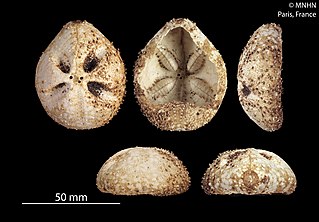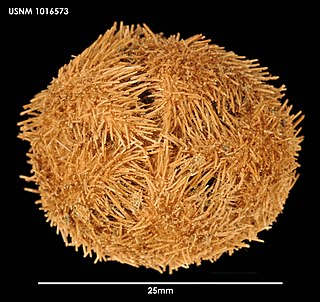
The Aspidodiadematidae are a family of sea urchins.

Acanthochelys is a genus of turtles, the spiny swamp turtles, in the family Chelidae, subfamily Chelinae, found in South America. Until recently, the species of this genus were considered to be members of the genus Platemys, but were moved to the resurrected genus originally described by Gray (1873) based on the type species by monotypy Acanthochelys spixii.
The World Register of Marine Species (WoRMS) is a taxonomic database that aims to provide an authoritative and comprehensive list of names of marine organisms.
Cassiduloida is an order of sea urchins. The group was extremely diverse with many families and species during the Mesozoic, but today, only seven extant species remain.

The Echinacea are a superorder of sea urchins. They are distinguished by the presence of a rigid test, with ten buccal plates around the mouth, and solid spines. Unlike some other sea urchins, they also possess gills. The group is a large one, with species found worldwide.

The Echinothurioida are an order of sea urchins in the class Echinoidea. Echinothurioids are distinguished from other sea urchins by the combination of a flexible test and hollow spines. The membrane around the mouth contains only simple plates, in contrast to the more complex mouth parts of their close relatives, the Diadematoida. They are nearly all deepsea dwellers.
Clypeosectus is a genus of sea snails, marine gastropod mollusks in the family Lepetodrilidae.

The Camarodonta are an order of globular sea urchins in the class Echinoidea. The fossil record shows that camarodonts have been in existence since the Lower Cretaceous.

Amphipneustes davidi is a species of sea urchin of the family Temnopleuridae. Their armour is covered with spines. It is placed in the genus Amphipneustes and lives in the sea. Amphipneustes davidi was first scientifically described in 2010 by Madon-Senez.

Amphipneustes koehleri is a species of sea urchin of the family Temnopleuridae. Their armour is covered with spines. It is placed in the genus Amphipneustes and lives in the sea. Amphipneustes koehleri was first scientifically described in 1905 by Ole Mortensen.

Araeosoma thetidis is a species of sea urchin of the family Echinothuriidae. This species can be found in deep sea off Australia and New Zealand. A. thetidis was first scientifically described in 1909 by Hubert Lyman Clark.

Echinometra is a genus of sea urchins in the family Echinometridae.
Breynia desorii is a species of sea urchins of the Family Loveniidae. Their armour is covered with spines. Breynia desorii was first scientifically described in 1851 by Gray.
Calymne relicta is a species of sea urchins of the Family Calymnidae. Their armour is covered with spines. Calymne relicta was first scientifically described in 1877 by Thomson.

Cassidulus caribaearum is a species of sea urchins of the family Cassidulidae. Their armour is covered with spines. Cassidulus caribaearum was first scientifically described in 1801 by Jean-Baptiste de Lamarck.
Cassidulus infidus is a species of sea urchin of the family Cassidulidae. Their armour is covered with spines. Cassidulus infidus was first scientifically described in 1948 by Ole Theodor Jensen Mortensen.

Cassidulus mitis is a species of sea urchin of the family Cassidulidae. Their armour is covered with spines. Cassidulus mitis was first scientifically described in 1954 by Krau.

Centrocidaris is a monotypic genus of sea urchins belonging to the family Cidaridae. The only species is Centrocidaris doederleini. Their armour is covered with spines. Centrocidaris doederleini was first scientifically described in 1898 by Alexander Agassiz.

The infraclassis Carinacea includes most living species of regular sea urchin, and fossil forms going back as far as the Triassic.
Cassidulus is a genus of echinoderms belonging to the family Cassidulidae.












